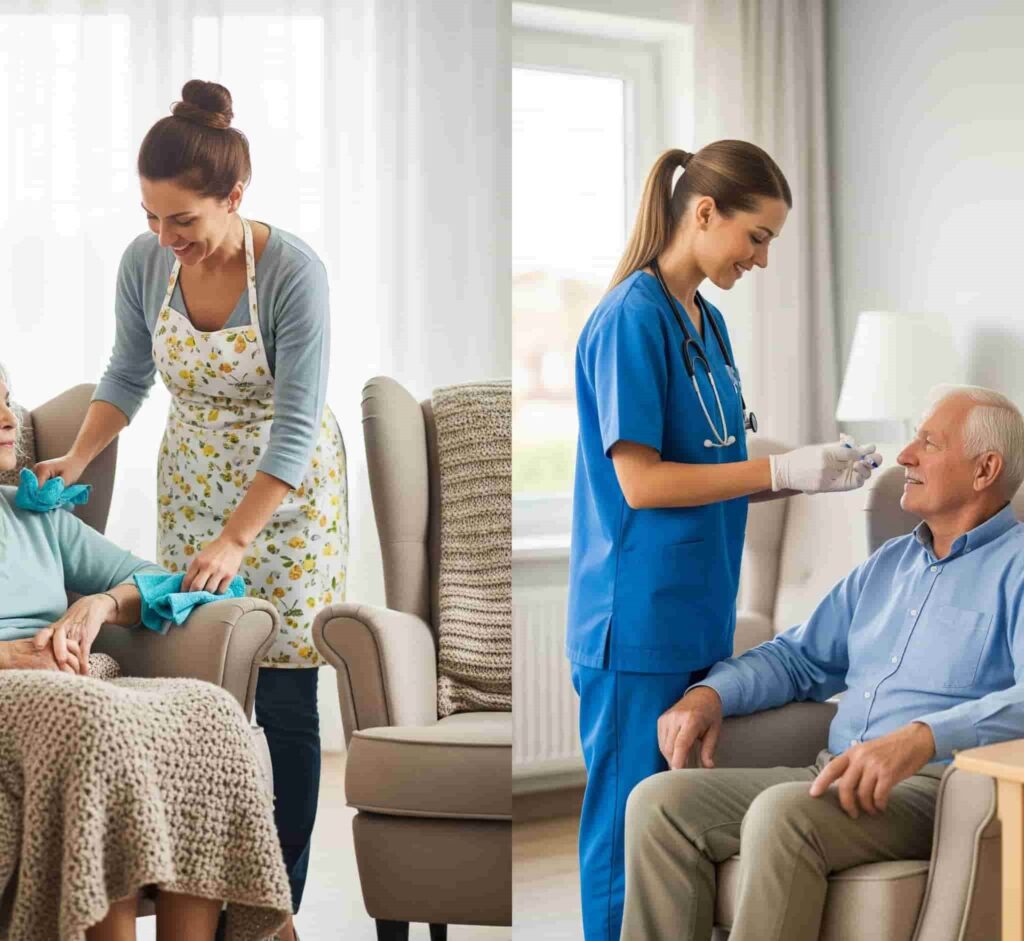-
Talk to Our Care Planner
At Home Assisted Living: Real Help Without Leaving Home
What People Really Mean by ‘At Home Assisted Living.’
“At-home assisted living” isn’t an official term used in healthcare, but it has become one of the most common ways people describe their need for daily support services for seniors, delivered directly at home.
They’re not looking for medical equipment or a nurse every hour. They’re looking for someone to help mom get out of bed, get dressed, have a warm meal, stay clean, take meds on time, and maybe go for a walk while still living in her house.
In other words: assistance for elderly living at home. And if that’s what you’re looking for, you’re in the right place.
TABLE OF CONTENTS
The Difference Between Assisted Living and Home Care

Let’s clear up the confusion between standard assisted living vs care at home.
-
Assisted living
Assisted living is a type of residential facility.
Seniors move into a dedicated community where they receive meals, medication reminders, basic help with hygiene and dressing, and social activities all in a structured, non-medical environment. It’s not a nursing home. It’s not home, either.
-
Home care
Home care on the other hand, brings that same level of help directly to the senior’s house.
A trained caregiver visits on a schedule that fits your family’s needs sometimes for just a few hours a day, sometimes 24/7. It’s flexible, personal, and keeps the elder in familiar surroundings.
So, when people say, “assisted living at home,” what they really want is:
- Help with daily living activities (bathing, dressing, eating)
- Companionship and supervision
- Medication reminders
- Meal prep
- Transportation to appointments
- All while remaining at home
That’s non-medical in-home care, or what many simply call at-home assisted living.
Here’s a more complete comparison between all three common care options to consider: home care, assisted living and nursing homes.
How to Get Assisted Living–Level Support at Home

Most families discover the need for special care after a major health issue, such as sudden mobility issue, like when an aging parent suddenly can’t walk.
Deciding to get help is only half the battle. The harder part is figuring out where to find reliable, qualified caregivers and how to trust that the person walking into your parent’s home is competent, compassionate, and consistent.
You have two main options:
-
Scout and hire caregivers yourself
-
Work with a licensed home care agency
Each path comes with its own challenges, tradeoffs, and hidden tasks. Here’s what you need to know.
Option 1: Hiring a Caregiver Directly
Some families try to find a caregiver on their own, often through word of mouth, Facebook groups, or websites like Care.com. It can feel cheaper at first glance, and there’s a level of control that appeals to some.
But when you hire directly, you are the employer. That means:
-
You’re responsible for interviewing, vetting, and background checks
-
You have to handle scheduling and coverage if they call out
-
You’ll need to manage payroll, taxes, and legal employment classification
-
You may need to purchase liability insurance
-
If something goes wrong; injury, theft, inconsistency, you’re on your own
There are some wonderful caregivers out there. But finding them, and keeping them, is a full-time job. For most families already stretched thin, this becomes overwhelming fast.
Option 2: Working with a Licensed Home Care Agency
Home care agencies handle all the work and all the risk involved with hiring caregivers for you.
When you go through a licensed agency, they:
-
Recruit and thoroughly vet caregivers (interviews, references, criminal background checks, health screening)
-
Provide ongoing training and supervision
-
Handle all payroll, employment taxes, and liability coverage
-
Step in quickly if your usual caregiver is sick or unavailable
-
Match your loved one with a caregiver based on skills and personality
-
Provide structure, oversight, and accountability
This is often the faster and safer route. Agencies like Global One Home Care Boston already have a pool of trained caregivers so if you need help next week, they can likely start immediately.
Families who choose this route often say they sleep better knowing they’re not personally responsible for what happens.
How to Begin the Process of Hiring a Caregiver

Whether you go direct or through an agency, here’s what starting typically looks like:
-
Have a conversation with your parent (if possible) about what kind of help they’d accept. Not sure how to handle that conversation? Here is a checklist of the most important questions to ask your aging loved ones.
-
List out what support is truly needed: mornings only? Bathing help? Overnight monitoring? Meals?
-
If going the agency route, contact a few local agencies for a free consultation
-
Ask questions: How do you match caregivers? What happens if we don’t click with someone? Can we start small and add hours later?
-
Discuss pricing, flexibility, minimum hours, and whether they accept long-term care insurance
-
Book your first trial shift and see how your loved one responds
The first visit may feel strange at first but for many families, it brings a sense of calm they haven’t felt in months.
Remember: good help is not just about tasks. It’s about building trust, showing up on time, treating your parent with dignity, and giving you peace of mind. The right agency will help you get there, without making you do all the legwork.
Here’s how the process with home care agencies typically works:
- Initial Consultation
You speak with a care coordinator about your parent’s needs, schedule, health, mobility, and preferences. This can be done in person or by phone.
- Care Plan Creation
Based on that conversation, we design a custom plan. It might include daily personal care, meal support, light housekeeping, or even overnight supervision.
- Caregiver Matching
We select a caregiver who’s not only trained, but also a good personality fit. Compassion matters.
- Ongoing Monitoring and Adjustments
Life changes so should your care. We stay in touch and adapt the plan as needed.
You can start small (just mornings or evenings) or opt for full-day or live-in care. The beauty is: you stay in control.
Families often ask about PCAs and HHAs — these types of home aides have different roles depending on your needs.
What Services Are Included in at home assisted living

Every senior is different. That’s why we don’t use one-size-fits-all packages. That said, here’s what’s typically included in at-home assisted living services:
- Personal care assistance: help with bathing, dressing, grooming, toileting
- Meal planning and preparation
- Medication reminders (not administration unless provided by a nurse)
- Mobility assistance: transfers from bed to wheelchair, or help walking
- Companionship: reading together, talking, board games, light exercise
- Errands and shopping
- Transportation to medical appointments
- Light housekeeping: laundry, dishes, tidying up
- Cognitive stimulation for seniors with memory concerns
- Respite care for family caregivers needing a break
- Overnight care or live-in care for seniors who shouldn’t be left alone
You decide what’s needed and it can change over time.
To understand who’s providing care, here’s a quick look at the difference between caregivers and CNAs.
Costs and Insurance of At Home Assisted Living
Let’s talk about money. Most families are shocked to learn that an assisted living facility can cost $4,500 to $7,000 per month or more, depending on location.
In-home care is often far more affordable especially if your parent doesn’t need round-the-clock help.
Here’s a rough breakdown:
| Type of Service | Avg. Cost in US (2025) |
| Hourly in-home care | $28–$35/hour |
| Daily caregiver (8 hrs) | $200–$280/day |
| Overnight care | $250–$400/night |
| Live-in care (24/7) | $6,000–$9,000/month |
You only pay for the hours you need. That’s a huge advantage over facility pricing. You can see updated 2025 rates for assisted living cost and in-home care prices.
Does insurance cover it?
- Medicare does not cover long-term home care unless skilled nursing is involved
- Medicaid may cover some hours in certain states
- Long-term care insurance often covers in-home assistance
- Some veterans benefit and social security also include home care services
We can walk you through all your options.
You can compare that to the costs of home care or nursing homes to see what works best for your finances.
Why It’s the Right Option for Many Families
Every family has its own story. But we hear the same concerns again and again:
- “She doesn’t want to leave her home.”
- “We promised Dad we’d never put him in a facility.”
- “He’s just lonely he doesn’t need a nurse, just some help.”
- “I can’t keep doing this alone.”
At-home assisted living is often the right middle ground between full independence and full-time care. It protects your parent’s dignity while keeping them safe. It gives you peace of mind without guilt.
Benefits include:
- Staying in familiar surroundings
- One-on-one attention from a caregiver
- Flexible scheduling
- Safer environment for seniors with dementia
- Avoiding hospital readmissions
- Less isolation and more meaningful daily interaction
And for many families, it simply feels better than a facility ever could.
At Home Assisted Living at Global One Home Care
We’ve worked with hundreds of families who were in your shoes; overwhelmed, uncertain, and tired.
At Global One Home Care, we believe real help should be:
- Simple to arrange
- Based on your needs and preferences
- Delivered with compassion and respect
- Reliable, professional, and consistent
We serve families across the greater Boston area with trained, vetted, and compassionate caregivers who show up when they’re supposed to — and do the work with love.
If you’re searching for assistance for elderly living at home, we’re here to help.
Ready to explore your options?
Let’s talk. Our care coordinator will walk you through exactly what your parent needs and how we can help make it happen.
👉Request a free consultation
Or call us now at (978) 678-3366 to speak to someone directly.
Final Thoughts
“At-home assisted living” may not be a textbook term, but it describes something real. Families are looking for ways to help their parents age in place, without sacrificing care, safety, or dignity.
Now you know: it’s possible. It’s practical. And it’s available.
Let us help you do it right.
Dr. Ella Njike is the branch administrator for Global One Home Care, Boston, an agency that provides quality care for seniors and kids or adults with disabilities. With a Doctorate and extensive experience working in the healthcare industry, Dr Ella brings a unique understanding to the challenges families face. Through Global One Home Care Boston, he ensures that care extends beyond daily tasks, focuses on building genuine connections and respecting each family's journey.
Contact us
We aim to be an active partner in your care, not to take over. You are the CEO of your care, and we support you in managing it effectively.
Here are some features of our Global One Home Care
- 24/7 access to care
- Customized care plans
- Supervisory visits
- Caregiver introductions
- Nutritional planning
- Respite support
- Companionship
- Mobility assistance
- Durable Medical Equipment recommendations
- Errands and Shopping
- Fall Prevention
- ADLs
